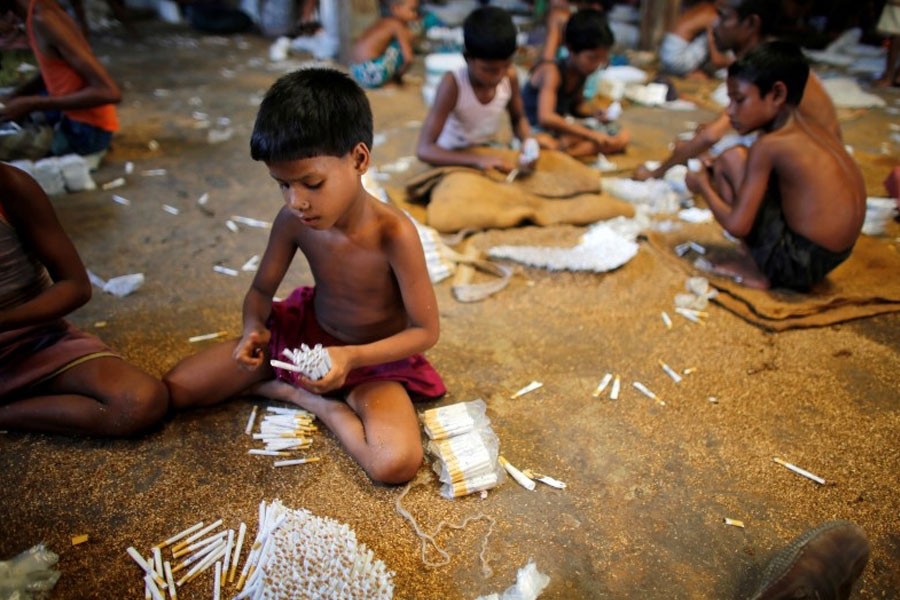Around 50 to 70 per cent of the labour force in the country's bidi industry is children, a research study found.
Although signboards in the bidi factories display that children are not allowed inside the units, the actual scenario is different. The factories, located in the country's two northern districts - Rangpur and Lalmonirhat, employ child labourers, aged between four to 12 years, violating the existing rules, it mentioned.
Progga, an advocacy organisation, and Syed Mahbubur Rahman, a faculty member of Business Administration at American International University-Bangladesh (AIUB), jointly conducted the study, whose findings have been unveiled recently.
Citing local labour leaders, the study said there were 35 bidi factories in Rangpur that counted around one-third of the total in Bangladesh. They also provided an estimation of around 40,000 labourers involved in bidi factories in the district.
"Grossly half of the labour forces were children, and among the adult labourers one-third was female. It was also revealed that there were nine factories in Lalmonirhat district that employed around 21,000 labours, including around 15,000 children aged 4-14 years that accounted for around 70 per cent of the labour force," it said.
Article 4 of the Children Act 2013 classifies anyone up to the age of 18 as child. However, according to the Labour Law 2006, minimum legal age for employment is 14 years.
The study team also found air inside the factories was heavily polluted and filled with tobacco powder and dusts. Many toddlers were found sleeping on the floor while their mothers were making bidi.
"Those children were bound to stay inside the factories for long hours until their mothers completed their work. It was a serious health threat to the children. In the entrance of factories it was explicitly mentioned that children under-14 were not allowed to enter. But, mothers, especially the breast-feeding mothers, could not go to the bidi units without their children."
Inside the factories, the temperature remained around 39 degree Celsius, which was apparently similar to heat-wave. In many factories there were no ceilings under the tinned rooftop, which raised the temperature inside.
Most of the labourers worked wearing undershirts while some of them were on bare body. Children were found involved in various stages of bidi production process, and the children inside the factories remained covered with tobacco dusts after hours of work.
The study has also found that the wages for child labourers is very low, even less than the national average.
For some households, majority of the family members were found engaged, anyhow and to any extent, in bidi production. The households, where at least one child worked in bidi factory, earned around Tk 3,000 (approximately US$ 40) on an average per month.
Among the children working in factories in Rangpur, around 15,000 regularly or irregularly attended schools, and the rest did not go to schools at all. Majority of the children who worked in the bidi factories could not complete primary education. It is alarming for any country, where the rate of school dropout is high.
According to the study, the children were found unaware of the health hazards while working in bidi factories. Children had suffered from malnutrition due to unhealthy work environment, use of tobacco and lack of balanced meals.
Discussions with the child workers unveiled that frequent fevers and coughs were common. Besides, headache, abdominal pain and other related problems, diarrhoea and muscle pain, chronic bronchitis and asthma were found due to their working inside bidi factories.
Citing a medical officer of Haragaachh Government Hospital in Rangpur, the study paper said around 80 per cent of the asthma patients had worked in bidi factories, which made them more vulnerable.
Although the proportion of asthma patients among children working in bidi factories was less, i.e., 10 per cent, this is distressing since risk of health hazard for the children is high because of possible continuation of work in bidi factory. Both the parents and the tobacco industry have been taking the opportunity of the vulnerable children.
The study suggested that proper implementation of the child labour-related acts, taking measures to lessen bidi demand and supply, and creating awareness among family members are badly needed to eradicate child labour in bidi factories.


